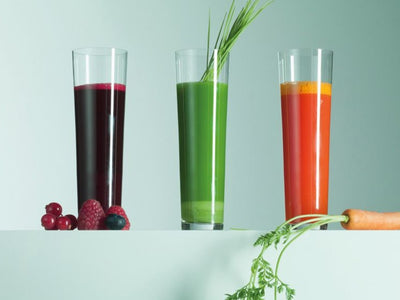Is Magnesium the Miracle Mineral?
Posted by Jim Applegate on

This unsung gem of the supplement world might just be the workhorse of your medicine cabinet. Find out how.
Last spring, I met with a nutritionist friend to chat about what dietary changes might alleviate stress, improve sleep and maintain stable blood sugar levels. Her number one suggestion? Magnesium. And in the months since I’ve upped my magnesium intake through natural foods and supplements, I’ve felt calmer, slept better and had more energy. But don’t take my word for it. Instead, consider the recent studies that back up magnesium as a dietary must.
Magnesium gets missed.
As researchers point out in a 2015 article in Nutrients, “Dietary intakes of magnesium in the United States have been declining over the last 100 years from about 500 milligrams per day to 175-225 milligrams per day.” The new recommended dietary allowance (RDA), however, is 320 milligrams per day for women and 420 milligrams per day for men. The reason for the gap may be that Western diets are high in processed foods and low in magnesium-rich green vegetables.
Magnesium is good for the brain.
Studies have shown that in patients with Alzheimer’s, those with lower magnesium levels have more-advanced stages of the disease. Researchers have also discovered that magnesium can protect against neurological deficits after brain injuries.
Magnesium makes you happy.
In a brand-new study published in PLoS One, a team from the University of Vermont reveals that magnesium is an effective and safe treatment for depression. More than 350 million people worldwide suffer from the disease, but supplementing with magnesium might be one drug-free way to beat it. Study participants who took four 500-milligram tablets of magnesium chloride daily during the course of 6 weeks experienced a significant improvement in depression and anxiety symptoms.
It can help prevent heart disease and diabetes.
After analyzing 40 studies involving more than 1 million participants, Chinese researchers found that increasing dietary magnesium intake by 100 milligrams per day was associated with a 22% reduction in the risk of heart failure and a reduced risk of stroke, type 2 diabetes and all-cause mortality.

Here’s how to get more.
1. Drink more water. One study found that 2 liters of municipal tap water can provide up to 31% of the RDA for magnesium. While not every city has magnesium-rich water, you can call your water department and ask for values.
2. Seek more magnesium-rich foods , such as seeds, nuts, beans and leafy greens. Here’s how some of the top sources measure up:
- Pumpkin seeds: 168 mg/cup
- Almonds: 386 mg/cup
- Cooked spinach: 157 mg/cup
3. Supplement with magnesium. Magnesium supplements are available at health food stores and make a good addition to your daily diet.
Written by Sarah Tuff Dunn for Clean Eating Magazine and legally licensed through the Matcha publisher network. Please direct all licensing questions to legal@getmatcha.com.








